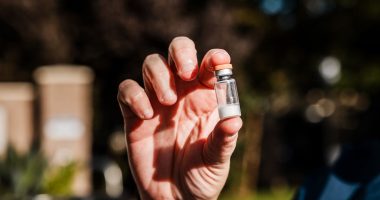
The NCAA announced a preliminary list of 20 schools being considered to host the Division I Softball Championship, and three of them — Alabama, Arkansas and Tennessee — have recently passed laws that ban transgender girls and women from competing on women’s sports teams.
The final list of 16 schools that will host regional round games will be announced May 16, about a month after the NCAA released a statement backing trans athletes as more than 30 states considered legislation to limit their participation.
“When determining where championships are held, NCAA policy directs that only locations where hosts can commit to providing an environment that is safe, healthy and free of discrimination should be selected,” the April 12 statement said. “We will continue to closely monitor these situations to determine whether NCAA championships can be conducted in ways that are welcoming and respectful of all participants.”
Many advocates took the NCAA’s statement to mean that it wouldn’t consider states that had passed legislation targeting trans people to host tournaments.
“The NCAA is making it clear that their Board of Governors supports transgender athletes, and the board should hold those states passing these harmful laws accountable,” Rodrigo Heng-Lehtinen, deputy executive director of the National Center for Transgender Equality, said in a statement at the time.
But the organization’s recent list of potential hosts for an early round of the softball tournament appears to call into question whether the NCAA will be holding states accountable.
Karen Weaver, a former college field hockey coach and athletic administrator now on the faculty at Penn, called the NCAA statement as “wishy washy as you can get.”
Weaver told The Associated Press the NCAA’s statement was “carefully worded,” and that’s likely due in part to legislation in Congress known as the name, image, likeness, or NIL bill, which would allow athletes to make money on the use of their name, image or likeness.
She said it’s a “tenuous time to be taking any kind of stance that might be viewed as political,” because the NCAA is trying to “craft their future in the Congress and Senate with the NIL legislation.”
“They’re trying to not tick off any potential folks who might vote for something that benefits the NCAA the most,” Weaver told the AP.
The 20 potential regional sites for baseball will be announced next week, and that list will be pared to the 16 official hosts on May 31.
Jeff Altier, the NCAA Division I Baseball Committee chairman and the athletic director at Stetson, told the AP last month that his committee had not received a directive to exclude any school from consideration for hosting a regional.
Altier referred other questions to the NCAA.
Seven states total — Arkansas, Alabama, Tennessee, Mississippi, West Virginia, South Dakota and Idaho — have laws banning trans girls from competing on girls sports teams, though a federal judge blocked Idaho’s law from taking effect in August pending the outcome of a lawsuit. All of the laws ban trans girls from competing in middle and high school sports. Laws in Arkansas, Virginia and Mississippi also include college sports teams.
Gail Dent, spokeswoman for the Board of Governors, did not respond to questions about the NCAA’s willingness to pull events out of states with bans.
“It’s surprising the NCAA would say one thing, that they are monitoring it, and then select site locations that are in areas of the country that are doing anti-trans, anti-LGBTQ legislation,” said Shane Windmeyer, founder and executive director of Campus Pride, a national organization advocating for safer college environments for LGBTQ students.
Windmeyer said the NCAA’s Office of Inclusion has been an ally. He said Campus Pride and similar organizations have received grants from the NCAA to fund diversity and inclusion summits and other programming.
The NCAA has had policies in place since 2011 that allow for transgender participation in sports. Testosterone suppression treatment is required for transgender women to compete in women’s sports.
In 2016, the NCAA made good on its threat to pull championship events out of North Carolina in response to the “bathroom bill,” which required transgender people to use restrooms according to their sex at birth and not their gender identity. Greensboro lost first- and second-round games in the men’s basketball tournament in 2017; they were moved to Greenville, South Carolina. The law was repealed before the NCAA could take away more events.
“When they got involved with the bathroom bill in North Carolina, that was, in my opinion, a bold step for them,” Weaver said. “I’m not seeing that same enthusiasm right now.”
The NCAA traditionally selects baseball and softball regional sites based on a team’s performance as well as quality of facilities and financial considerations. This year, potential sites were pre-determined because each must be evaluated for its ability to meet the NCAA’s Covid-19 protocols.
Four of the top five teams in this week’s D1Baseball.com Top 25 — No. 1 Arkansas, No. 2 Vanderbilt, No. 4 Mississippi State and No. 5 Tennessee — ordinarily would be considered shoo-ins to be regional hosts. The four schools confirmed to The Associated Press they submitted bids to host but declined interview requests on the topic of the NCAA’s decision.
Since 2000, the home team has won 67.5 percent of baseball regionals, and there is money to be made, too. A University of Arkansas study showed baseball fans visiting the Fayetteville area spent about $2 million during a three-day regional in 2018, excluding the cost of tickets and in-stadium purchases.
For now, everyone waits to see the next step on site selections from the NCAA, which has referred all questions to the Board of Governors statement.
Follow NBC Out on Twitter, Facebook & Instagram
Source: | This article originally belongs to Nbcnews.com









